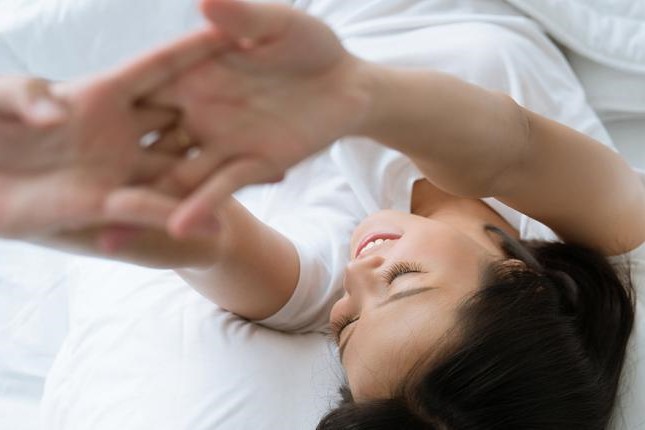
April 8, 2020, by Kate Rothery
Bedtime routines and the latest apps – your tips for a good night’s sleep
With (way) more time at home, we should all be feeling well rested right? However, even with endless early nights stretching out ahead, many of us may still be struggling to reach the recommended 8 hours.
Our Engage ambassador Alex Pitt took a look at how you can improve your sleeping patterns and took over our Instagram to ask you for your top sleeping tips!
For more information and resources to help you look after your wellbeing at home, visit our new online Health and Wellbeing Home.
………………
We all understand the importance of sleep. A bad night’s sleep makes your day seem so much more difficult. As well as feeling physically tired, it can affect your mood and your mindset. As a student you need to prioritise your sleep and make sure you can focus properly on getting your work done to the best of your ability.
The NHS advise that most adults need 8 hours of sleep a night. Without it, we could be putting ourselves at increased risk of chronic conditions such as heart disease, high blood pressure and diabetes.
But if you’re finding it hard to sleep and stay asleep – this can just pile on the pressure. What can you do to achieve those 8 hours?
Find your way to wind down
Finding the best way for you to relax before bedtime is really important and it’s different for everyone. The NHS have plenty of options you can try.
“I find exercising after I’ve finished my work actually really helps me wind down. I finish my Uni work, do a workout then have dinner, a shower and head to bed. I’m quite strict about not going back to work so I’m not thinking about it when I’m trying to sleep.”
“I usually read a book before I go to sleep and for fun – not more revising!”
Choose a regular bedtime
Bedtime routines aren’t just for little ones – it can really help adults set their body clock as well. Try to go to sleep around the same time each evening, and hard though it can seem, try to avoid long lie ins. This will help your body ‘expect’ sleep and make it easier to nod off.
“During the week, I do try to go to bed at the same time each evening just so I can get up and be ready for my morning lectures. At the weekends, I’m less strict but I don’t lie in bed for ages as I find it throws me off for the rest of the day.”
Monitor your screen time
The NHS recommends avoiding electronic devices before bedtime and getting into the habit of browsing online in your bedroom. These devices can weaken sleep associations and make it harder to sleep.
“It’s so hard to avoid scrolling through my phone until really late at night especially when there’s so much going on in the news all the time. I try to leave it in my drawer or use do not disturb so I’m not tempted to keep checking notifications.”
Create a relaxing sleep space
We’re all spending a lot more time than we usually do at home and so we’ve got a great opportunity to clear out and design our spaces. Having a clean and tidy space to sleep is really helpful for relaxing and any touches you can add to make it more comfortable, even better.
“I have the comfiest mattress – if I’m ever away I miss it!”
“Before I go to bed, I spend 5 minutes tidying away everything from the day – empty cups, plates and any notes I’ve been working on. Sometimes I may just move them to the corridor admittedly, but it still helps!”
Cut down on caffeine
It may seem obvious, but avoiding caffeine later in the day can really help get a good night’s sleep. Don’t be tempted to reach for an energy drink if you’re tired later on.
“I love my coffee but I do try to avoid drinking anything with caffeine in the evening as it keeps me awake. As a treat I might have a hot chocolate or a big glass of water means I’m better hydrated too.”
Try out a sleep app
We had lots of suggestions in about apps that can help you sleep better. Here are some of your favourites:
- Apple bedtime: This allows you to set what time you want to go to sleep and then what time you want to wake up. You get a notification before bedtime starts and your phone will automatically switch to do not distub during your bedtime hours.
“I like Apple bedtime because you can set it for different days of the week. At weekends I do allow myself a little lie in!”
- Pzizz: Recommended by the NHS, the Pzizz app uses ‘dreamscapes’ – a mix of music, voiceovers and sound effects to help you sleep better at night or take power naps.
“When I’ve had a busy day or I have a lot going on, I need something to listen to to quieten the noise really. This just helps me to wind down before I go to sleep.”
- Sleepio: Another NHS recommended app, Sleepio uses Cognitive Behavioural Therapy (CBT) to help you to rest your natural sleeping pattern. It may be worth a try if you find that other methods aren’t helping as much as you’d like.
Try new things but stick with what works for you
Finding a good sleeping pattern is very personal. Something that works for someone else may not work for you. It’s important to give new things a chance to find out what routine and tips work best for you.
No comments yet, fill out a comment to be the first

Leave a Reply